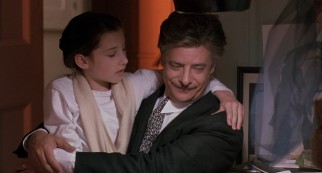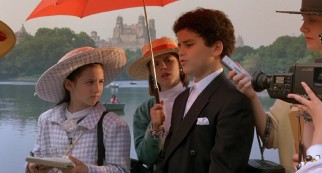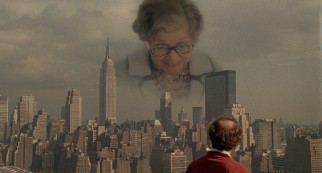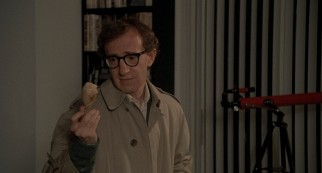New York Stories Blu-ray Review
 |
New York Stories
Theatrical Release: March 3, 1989 / Running Time: 124 Minutes / Rating: PG Directors: Martin Scorsese, Francis Ford Coppola, Woody Allen / Writers: Richard Price, Francis Ford Coppola, Sofia Coppola, Woody Allen Cast: Life Lessons: Nick Nolte (Lionel Dobie), Rosanna Arquette (Paulette), Patrick O'Neal (Phillip Fowler), Steve Buscemi (Gregory Stark), Jesse Borrego (Reuben Toro), Illeana Douglas (Paulette's Friend), Brigitte Bako (Young Woman), Paul Herman (Cop), Victor Argo (Cop), Peter Gabriel (Himself), Deborah Harry (Girl at Blind Alley) / Life Without Zoe: Talia Shire (Charlotte Montez), Giancarlo Giannini (Claudio Montez), Heather McComb (Zoe Montez), Don Novello (Hector), Jenny Nichols (Lundy), James Keane (Jimmy), Selim Tlili (Abu), Carole Bouquet (Princess Soroya), Chris Elliott (Robber), Paul Herman (Clifford the Doorman), Adrien Brody (Mel) / Oedipus Wrecks: Woody Allen (Sheldon Mills), Mia Farrow (Lisa), Julie Kavner (Treva Marx), Mae Questel (Sadie Millstein), Marvin Chatinover (Psychiatrist), Jessie Keosian (Aunt Ceil), George Schindler (Shandu the Great), Bridgit Ryan (Rita), Mayor Edward I. Koch (Himself), Larry David (Theater Manager), Ira Wheeler (Mr. Bates), Paul Herman (Detective Flynn), Kirsten Dunst (Lisa's Older Daughter - uncredited) |
Buy New York Stories from Amazon.com: Blu-ray • DVD • Instant Video
Many American film directors emerged as important voices in the 1970s. Three of the biggest -- Martin Scorsese, Francis Ford Coppola, and Woody Allen -- came together in Touchstone Pictures' 1989 anthology New York Stories.
All three of the filmmakers gave us what many still consider their best work in the '70s. Coppola's The Godfather and its sequel and Allen's Annie Hall all won Best Picture Oscars, with each of them winning directing and screenplay Oscars that decade as well. All tallied, the three men had a hand in seven of the decade's fifty Best Picture nominees. New York City had featured prominently in each director's best-known work, unsurprisingly considering Scorsese and Allen were natives and Coppola was drawn to an organized crime saga. New York Stories very much reflects where the three auteurs were at the time. The featured actors lend to easy identification of the makers, with each casting past and future collaborators. The style and sensibilities of Scorsese and Allen are also evident, while Coppola's central effort is far less characteristic.
The film opens with Scorsese's Life Lessons (44:26), a product of the director's Bohemian phase and most kindred to his dark comedy After Hours. It centers on tormented artist Lionel Dobie (Nick Nolte), who is stressed by the prospect of an upcoming show. Even more distressing is his suddenly strained relationship with his live-in assistant, muse, and mistress Paulette (Rosanna Arquette). An aspiring painter herself, she shocks him with her plan to move out of his loft. Lionel is able to persuade her to stay as a platonic and professional colleague. Clearly, though, he is not over her. The mere sight of her drives the messy, bearded individual crazy. Fueled by alcohol, jealousy, unrequited love, and his often loudly revisited audio cassettes (a playlist that leans heavily on Procol Harum's "Whiter Shade of Pale" and Bob Dylan and The Band's version of "Like a Rolling Stone"), Lionel is able to produce some of the most meaningful abstract art of his life.
Flavorful, mature, and romantic, Life Lessons is the highlight of this film and offers a brand of contemporary Scorsese we haven't really seen since, Life Lessons features a young Steve Buscemi in one of his first big movie roles as performance artist Gregory Stark, who performs comic monologues (written by Buscemi himself) on abandoned subway tracks, falling far short of Dobie's definition of art, which is "you make art because you have to, 'cause you got no choice."
Francis Coppola's (he dropped the "Ford" in the '80s) Life Without Zoe (34:19) is the film's insignificant weak link, although it is noteworthy for being the first writing credit of Coppola's daughter Sofia, who has since blossomed into an esteemed director herself and an original screenplay Oscar winner. When she co-wrote this segment, though, she was only 17 and just as unqualified as any teenager to be scripting a segment to be sandwiched between Scorsese and Allen.
The childish Zoe owes a considerable debt to Kay Thompson's enduring Eloise picture book series. It applies the same premise -- precocious rich girl lives out of a fancy Manhattan hotel with a dog and friendly hired help by her side while her worldly parents do exciting work elsewhere -- to 12-year-old Zoe (Heather McComb, the future first Mrs. James Van Der Beek). Though cinematically composed, the Coppolas' segment has the feel of a Saturday morning television show and not a very good one. Young Sofia's ideas are all over the place: Zoe walks in on a random robbery of the hotel's safety boxes, she interviews a Middle Eastern sheik's nephew (a plot point reminiscent of Disney's Eloise at the Plaza TV movie), and attends a costume party.
You can feel the fatherly love in Francis' willingness to appease his daughter (who also receives credit for costumes and the surname-dropping title design), empowered affection that would bring them both grief the following year when Sofia stepped in for a bowed out Winona Ryder to play Michael Corleone's daughter in The Godfather Part III, producing one of the most maligned performances in cinema history.
Coppola has his sister Talia Shire, The Godfather's Connie, and Italian legend Giancarlo Giannini play Zoe's roaming parents, a respected photographer and flautist, respectively. They have just as little to do here as anyone else in a cast that bizarrely includes Chris Elliott as a robber, Don Novello (SNL's Father Guido Sarducci) as Zoe's butler, and a teenaged Adrien Brody who receives his first theatrical credit but appears to have been cut from the film.
New York Stories closes with Oedipus Wrecks (38:53), a segment that is pure Woody Allen. The writer/director stars as Sheldon Mills, a successful 50-year-old lawyer with lingering mother issues that require plenty of therapy. His overbearing Mom, Sadie Millstein (Mae Questel), is a constant source of embarrassment and condescension. Sheldon introduces her to Lisa (Mia Farrow, Allen's partner at the time), his nice girlfriend of several months, whom he intends to marry. Sadie, of course, objects. The disappearance troubles Sheldon, but once he accepts it, he finds his life and romance a lot less stressful. That is until, Sadie materializes as a much larger than life presence in the Manhattan sky. Suddenly, the mother is loudly conducting conversations with complete strangers for all to hear and revealing her misgivings about her son and his marriage plans. When therapy cannot help this inexplicable situation, Sheldon is referred to Treva Marx (Julie Kavner, the voice of Marge Simpson), a psychic whose practices he faithlessly tolerates. Romance and resolution follow.
This strange comic storyline couldn't have worked at feature length, so this is a good outlet for it and one which Allen made on top of his firm one film per year schedule. This diverting tale taps into Allen's favorite subjects of fascination: love, neuroses, family, and the flabbergasting. Whether it reflects his own mother's behavior or simply the old Jewish stereotype, we might never know. But this little-known segment compares favorably to a number of Allen's feature films.
Shortly before launching "Seinfeld", "Curb Your Enthusiasm" star/creator Larry David shows up briefly here as the magician's theater manager, his second of three Woody Allen movie roles. A 6-year-old Kirsten Dunst also makes an uncredited screen debut in this segment, just barely appearing as one of Lisa's three kids.
While anthology films are rarely made and rarely seen as commercial enterprises, New York Stories grossed a respectable $10.8 million in theaters, which inflation adjusts to $21.5 M today, a sum that would be appreciated by Allen and both generations of Coppola, if not Scorsese who has been enjoying the biggest returns of his career in recent years. Still, the receipts weren't enough to clear the film's estimated $15 M production budget.
Although they are currently taking some strides, Walt Disney Studios Home Entertainment has largely resisted releasing anything to Blu-ray that isn't an animated Disney film. They have farmed out a decent chunk of their large live-action catalog from the Touchstone and Hollywood Pictures divisions to Mill Creek Entertainment, who quietly began with some Target exclusives last year. New York Stories recently made its Blu-ray debut among a handful of other not quite household Disney properties in general retail.
VIDEO and AUDIO Picture quality on this Blu-ray is nothing short of stunning. Mill Creek has a bad reputation among DVD buffs because the value-driven studio has tended to overload discs with content at the cost of presentation. This is the second Blu-ray release of theirs I have reviewed, though, and I could not be more pleased. Framing the film in its 1.85:1 widescreen theatrical aspect ratio (as opposed to the DVD's 1.33:1 open matte), New York Stories' picture is extremely sharp, clean, and detailed. Fine film grain is present but minimal. Crisp, clear, and substantial, the 2.0 DTS-HD master audio is also exemplary. I can't imagine this little film looking or sounding any better in the hands of Disney themselves or any other major studio. The white English subtitles are presented in all caps, which is a little strange, but at least they're there.
BONUS FEATURES, MENUS, PACKAGING and DESIGN New York Stories is joined by just one bonus feature and that is one more than its DVD contained. Appropriately enough for a Woody Allen film, that extra is the film's original theatrical trailer (3:13), presented in blurry 1.33:1 standard definition. It's pretty amazing that Mill Creek included this after Disney themselves neglected to. Nice job! The cool menu montage gives a visual and musical taste of all three segments. Though the disc does not support bookmarks, it does resume playback after your player powers down, a far better feature as far as I'm concerned. The chapter submenu does a nice job of delineating the segments. Even the packaging deserves recognition for the tasteful double-sided artwork it nicely employs, which makes up for the listed runtime being short by 16 minutes.
CLOSING THOUGHTS New York Stories is an extremely mixed bag, but it is essential viewing for fans of three of the most celebrated directors in modern American film. Between the terrific widescreen feature presentation and the welcome inclusion of the film's trailer, Mill Creek's Blu-ray is everything it should be and well worth considering at its current sale price of under $6. If more studios turned their catalog titles over to Mill Creek for this kind of Blu-ray treatment, there would be many satisfied film fans and a more exciting marketplace. Support this site when you buy New York Stories now from Amazon.com:
|
Related Reviews:
DVDizzy.com | DVD and Blu-ray Reviews | New and Upcoming DVD & Blu-ray Schedule | Upcoming Cover Art | Search This Site
Martin Scorsese: Taxi Driver • The Last Temptation of Christ • Shine a Light • Hugo
Woody Allen: Annie Hall • Whatever Works • You Will Meet a Tall Dark Stranger • Midnight in Paris
Francis Ford Coppola: The Godfather Trilogy • Bram Stoker's Dracula • John Grisham's The Rainmaker • Jack
Anthology Films: Four Rooms • New York, I Love You • Fantasia & Fantasia 2000
New to Blu-ray: Father of the Bride & Father of the Bride Part II (2-Movie Collection) • Being John Malkovich (Criterion Collection)
Nick Nolte: The Thin Red Line • Tropic Thunder | Talia Shire: Rocky | Giancarlo Giannini: Shadows in the Sun
1980s on Blu-ray: Scrooged • Planes, Trains & Automobiles • Platoon • Dead Poets Society
Eloise at the Plaza • Punky Brewster: Turn Your World Around
New York Stories Songs List: Life Lessons: Procol Harum - "Whiter Shade of Pale", Cream - "Politician", Ray Charles - "The Right Time", Bob Dylan/The Band - "Like a Rolling Stone", "It Could Happen to You", "That Old Black Magic", "Stella By Starlight", Procol Harum - "Conquistador", Mario Del Monaco - "Nessun Dorma (from Puccini's Turandot)", Transvision Vamp - "Sex Kick", The Hot Club of France with Django Reinhardt & Stephane Grappelli - "What Is This Thing Called Love", The Hot Club of France with Django Reinhardt & Stephane Grappelli - "Bolero De Django" / Life Without Zoe: Kid Creole and the Coconuts - "Zoe", "Daiquiri Daiquira", "Schoolin'", "Abu", "The Robbery", "People Will Talk", "Party Girl", "Don't Lead Me On", "March of the Waiters", "My Love", "Takin' a Holiday"; Thick as Thieves - "12th Street", Selim Tlili - "Blue Suede Shoes", Pianosaurus - "Back to School" / Oedipus Wrecks: Frankie Carle - "I Want a Girl (Just Like the Girl That Married Dear Old Dad", Bernie Leighton - "Mother", Benny Goodman - "Sing, Sing, Sing", Wilbur de Paris - "In a Persian Market", Liberace - "I'll Be Seeing You", Wilbur de Paris - "I've Found a New Baby", David Rose & His Orchestra - "All The Things You Are", David Rose & His Orchestra - "June in January"








